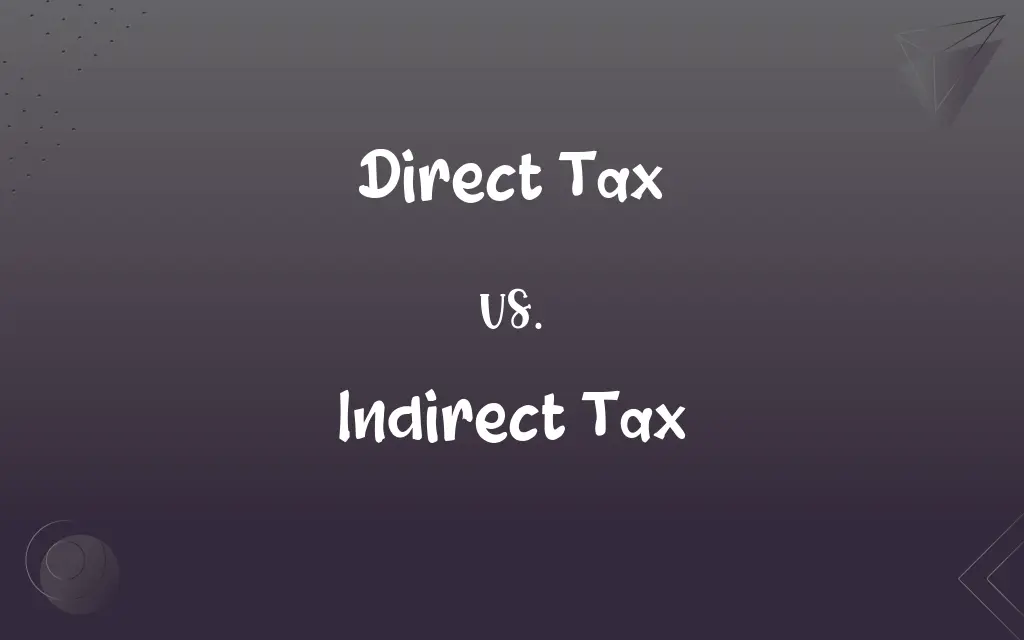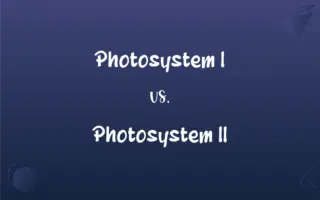Direct Tax vs. Indirect Tax: What's the Difference?
Edited by Aimie Carlson || By Harlon Moss || Updated on October 20, 2023
Direct tax is paid directly by individuals or organizations to the government based on income or assets, while indirect tax is collected by intermediaries from the end consumer, like sales tax on goods.

Key Differences
Direct tax and indirect tax are two primary mechanisms through which governments raise revenue, but they function quite differently. A direct tax is imposed upon an individual or entity and is based on their ability to pay, typically focusing on income, wealth, or other assets. On the other hand, an indirect tax is imposed on the sale of goods and services, and its impact depends on consumption patterns, not directly on personal income or wealth.
The responsibility of paying a direct tax lies with the individual or organization on whom it's levied. Examples include income tax, where people pay a fraction of their earnings, or property tax, where homeowners pay based on the assessed value of their property. In contrast, an indirect tax is collected by an intermediary, such as a retailer. The end consumers bear the tax cost, even though they don't pay it directly to the government. Instead, they pay when purchasing goods or services, with the intermediary then forwarding the collected tax to the government.
One of the distinguishing features of a direct tax is its progressive nature. This means that higher income or wealth levels might be taxed at higher rates, ensuring that those with greater ability to pay contribute more to public finances. Indirect taxes, conversely, are often regressive. Since they are applied uniformly regardless of the buyer's income, lower-income individuals might find a larger percentage of their disposable income going to such taxes than higher-income individuals do.
Accountability and transparency can vary between direct tax and indirect tax. With direct taxes, taxpayers usually file returns, providing a detailed account of their taxable income and deductions. This process can be intricate, requiring careful record-keeping. Indirect taxes, in comparison, are less visible to consumers. While you might notice a sales tax added to your bill, you might not always be aware of other indirect taxes embedded in the price of goods.
Both direct tax and indirect tax serve crucial roles in fiscal policy. Governments might adjust rates or introduce new categories to influence economic behavior, promote fairness, or address budgetary needs. For instance, a high direct tax might be used to reduce income inequality, while an indirect tax on harmful products, like tobacco, can be a deterrent to consumption.
ADVERTISEMENT
Comparison Chart
Payment
Paid directly to the government by individuals/entities.
Paid to intermediaries and then forwarded to the government.
Basis
Based on income, wealth, or assets.
Based on consumption of goods and services.
Progressiveness
Typically progressive, higher rates for higher incomes.
Often regressive, impacting lower incomes more.
Transparency
Requires detailed tax returns.
Less visible, embedded in product prices.
Examples
Income tax, property tax.
Sales tax, value-added tax (VAT).
ADVERTISEMENT
Direct Tax and Indirect Tax Definitions
Direct Tax
Requires filing detailed returns to the government.
He hired an accountant to manage his direct tax filings.
Indirect Tax
Often embedded in the final price of a product.
Consumers might not always realize the indirect tax they're paying.
Direct Tax
A tax paid directly to the government based on income.
She set aside a portion of her salary to cover her direct tax obligations.
Indirect Tax
Tax on the consumption of goods and services.
He noticed the indirect tax added to his restaurant bill.
Direct Tax
Progressive in nature, taxing higher incomes more.
The direct tax system ensures that the wealthy contribute a fair share.
Indirect Tax
Can be used to influence consumption behavior.
The government raised the indirect tax on cigarettes to deter smoking.
Direct Tax
Directly impacts the payer without intermediaries.
Businesses are responsible for their direct tax payments to the federal government.
Indirect Tax
Impacts consumers regardless of their income.
Everyone pays the same indirect tax rate on certain goods, regardless of their earnings.
Direct Tax
Levied on an individual's or entity's wealth or assets.
The millionaire faced a substantial direct tax on his vast estate.
Indirect Tax
Collected by intermediaries and passed to the government.
The store collects the indirect tax and then remits it monthly.
FAQs
Are indirect taxes always visible to consumers?
Not always. Some indirect taxes, like VAT, might be embedded in product prices.
What is a direct tax?
A direct tax is paid directly by individuals or organizations to the government based on income or assets.
Which tax can influence consumer behavior?
Both can, but indirect taxes are commonly used to influence consumption patterns, like taxing harmful products.
Can direct taxes be progressive?
Yes, direct taxes can be progressive, with higher incomes taxed at higher rates.
Can governments adjust tax rates for economic reasons?
Yes, governments might adjust both direct and indirect tax rates to influence economic behavior or address budget needs.
Can indirect taxes influence market prices?
Yes, indirect taxes can affect product prices and consumer choices.
Are indirect taxes always passed to the end consumer?
Typically, yes. Indirect taxes are usually shifted to the end consumer in product prices.
How is an indirect tax different?
An indirect tax is collected by intermediaries and is based on the consumption of goods or services.
Do I pay direct taxes on my property?
Yes, property taxes are a form of direct tax based on property values.
Who bears the ultimate burden of a direct tax?
The individual or organization on whom the direct tax is levied bears its burden.
Are all consumers affected equally by indirect taxes?
No, indirect taxes might impact lower-income individuals more, as they spend a larger portion of their income.
Is sales tax a direct or indirect tax?
Sales tax is an indirect tax, collected at the point of sale.
How is the indirect tax passed to the government?
Intermediaries, like retailers, collect indirect taxes and then remit them to the government.
Is income tax a form of direct tax?
Yes, income tax is a direct tax on individuals' earnings.
Can an indirect tax be regressive?
Yes, since indirect taxes are applied uniformly, they can be regressive, impacting lower incomes more.
Why might a government introduce new direct taxes?
To raise revenue, promote fairness, or influence economic behavior.
Are value-added taxes a form of indirect tax?
Yes, value-added taxes (VAT) are indirect taxes on consumption.
Do direct taxes require detailed record-keeping?
Yes, direct tax payments typically require detailed returns and record-keeping.
What's an example of a direct tax on wealth?
An estate tax or inheritance tax is a direct tax on wealth transfer.
Do businesses pay direct taxes?
Yes, businesses pay direct taxes on their income, profits, or assets.
About Author
Written by
Harlon MossHarlon is a seasoned quality moderator and accomplished content writer for Difference Wiki. An alumnus of the prestigious University of California, he earned his degree in Computer Science. Leveraging his academic background, Harlon brings a meticulous and informed perspective to his work, ensuring content accuracy and excellence.
Edited by
Aimie CarlsonAimie Carlson, holding a master's degree in English literature, is a fervent English language enthusiast. She lends her writing talents to Difference Wiki, a prominent website that specializes in comparisons, offering readers insightful analyses that both captivate and inform.































































